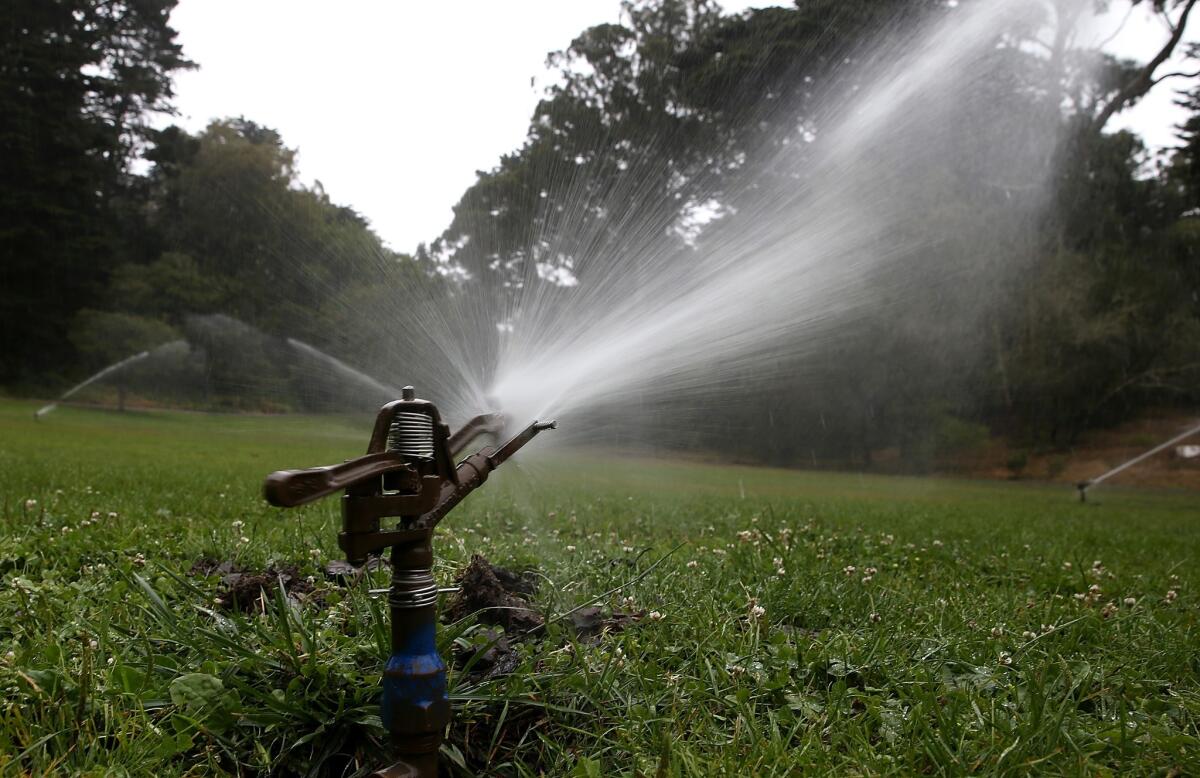City aims to further reduce water use

Sprinklers water a lawn in Golden Gate Park on July 15, 2014 in San Francisco, Calif. Following a public hearing Thursday, the Burbank City Council voted unanimously to enact stricter outdoor watering restrictions as part of the third phase of its water-conservation ordinance.
- Share via
Burbank has a billion-gallon challenge.
That’s how much water the city needs to conserve in order to meet state-mandated cuts that take effect June 1 this year and remain in effect until at least next February, compared to a June 2013 to February 2014 baseline.
That amounts to a 28% reduction in water use compared to its September 2014 usage, and it’s a cumulative goal. That means if the city falls short of its goal in June, it would need to make deeper cuts in the following months to make up for it. If not, the city could face fines of up to $10,000 a day, officials at Burbank Water and Power said.
Those officials hope that tightening restrictions on outdoor water use in addition to tougher enforcement of existing restrictions will help reach that goal. Following a public hearing on the matter Thursday, the City Council voted unanimously to enact such restrictions as part of the third phase of its water-conservation ordinance.
“Unfortunately we’re under order from the governor,” said Councilwoman Emily Gabel-Luddy after the vote. “This is a real ‘must do.’”
The increased restrictions ban misters, limit hand-watering of landscapes during the day, restrict outdoor sprinkler use from three days a week to two days — only one during winter months — and require covers on swimming pools and wading pools.
Staff had asked that the new restrictions take effect immediately, but City Council members voted to make the effective date June 1 to avoid springing the new rules on residents.
On an individual level, the cuts would take usage from a September 2014 baseline of 130 gallons per person per day to 117 gallons per person per day.
In a comparison, between June 2013 to February 2014 and June 2014 to February 2015, the city managed to achieve 7% water savings, said Bill Mace, assistant general manager at Burbank Water and Power.
Officials estimate cutting back on outdoor watering, which is the most intensive residential water use, could bring 10% to 11% in water savings. Enforcement of existing water restrictions already in place under phase two of the city’s water-conservation ordinance could bring another 6% to 8% in savings.
The utility has begun to issue fines to those who flaunt the water restrictions. The fine for a first-time offense is $100 and can increase to up to $500 for repeat offenders.
Utility officials verify complaints by checking for photos of the offending behavior submitted with the complaint or by checking utility data that shows spikes in usage on days when outdoor watering is not authorized, for example.
Residents get two warnings about their behavior before fines are issued, said Jeanette Meyer, marketing manager at the utility. Offenders who promise to change their behavior and attend a class can avoid the fine, she said.
The utility has no good way to monitor or enforce the way Burbankers use water indoors, but improvements in water efficiency for indoor use is estimated to bring 1% to 2% in savings, officials estimate.
Another 2% to 3% could come from large water customers converting their landscape irrigation and water-cooling towers to recycled water — treated wastewater that is not suitable for drinking water.
Councilmen David Gordon and Will Rogers both noted that city departments could do a better job of being a role model for outdoor watering behavior by adhering to the restrictions on outdoor irrigation to two days per week, even though the city is using recycled water, which is not subject to the limits.
Council members also asked for monthly reports updating them on how the city and its residents are doing in its billion-gallon challenge.